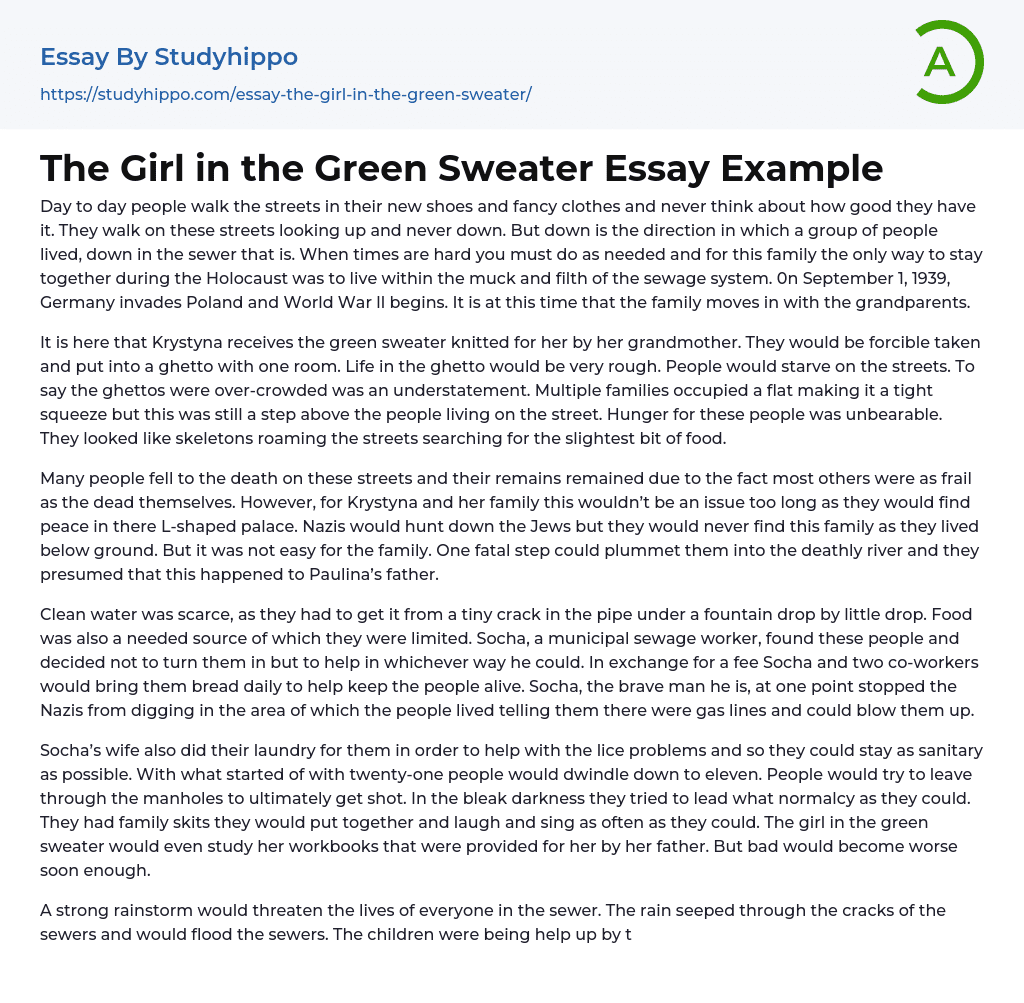Day to day people walk the streets in their new shoes and fancy clothes and never think about how good they have it. They walk on these streets looking up and never down. But down is the direction in which a group of people lived, down in the sewer that is. When times are hard you must do as needed and for this family the only way to stay together during the Holocaust was to live within the muck and filth of the sewage system. 0n September 1, 1939, Germany invades Poland and World War ll begins. It is at this time that the family moves in with the grandparents.
It is here that Krystyna receives the green sweater knitted for her by her grandmother. They would be forcible taken and put into a ghetto with one room.
...Life in the ghetto would be very rough. People would starve on the streets. To say the ghettos were over-crowded was an understatement. Multiple families occupied a flat making it a tight squeeze but this was still a step above the people living on the street. Hunger for these people was unbearable. They looked like skeletons roaming the streets searching for the slightest bit of food.
Many people fell to the death on these streets and their remains remained due to the fact most others were as frail as the dead themselves. However, for Krystyna and her family this wouldn’t be an issue too long as they would find peace in there L-shaped palace. Nazis would hunt down the Jews but they would never find this family as they lived below ground. Bu
it was not easy for the family. One fatal step could plummet them into the deathly river and they presumed that this happened to Paulina’s father.
Clean water was scarce, as they had to get it from a tiny crack in the pipe under a fountain drop by little drop. Food was also a needed source of which they were limited. Socha, a municipal sewage worker, found these people and decided not to turn them in but to help in whichever way he could. In exchange for a fee Socha and two co-workers would bring them bread daily to help keep the people alive. Socha, the brave man he is, at one point stopped the Nazis from digging in the area of which the people lived telling them there were gas lines and could blow them up.
Socha’s wife also did their laundry for them in order to help with the lice problems and so they could stay as sanitary as possible. With what started of with twenty-one people would dwindle down to eleven. People would try to leave through the manholes to ultimately get shot. In the bleak darkness they tried to lead what normalcy as they could. They had family skits they would put together and laugh and sing as often as they could. The girl in the green sweater would even study her workbooks that were provided for her by her father. But bad would become worse soon enough.
A strong rainstorm would threaten the lives of everyone in the sewer. The rain seeped through the cracks of the sewers and would flood the sewers. The children were being
help up by the adults and just as the water had risen up to there nostril’s the water had began to subside. The light was dim and it made it very hard to see but soon enough it became evident that one of their fellow peoples were pregnant. This abandoned mother had given her first child away before entering the sewer to an Aryan woman in hopes of saving the childs life. Once the baby was born, it would do just what any other baby would do, cry.
The mother would suffocate her baby in order to save the group; unbeknownst to her, Socha had found some nuns to take care of the newborn. The women was inconsolable. But for the girl in the green sweater the worst of any of their pains was yet to come. Socha will be struck by a Russian army truck and die. For the girl in the green sweater this will be a pain greater than the death of any of her family. He helped the people in the sewer walking two kilometers each way through the sewers to bring food and supplies. He laid his life on the line for the lives of others. He would be the hero of these Jews.
- Anne Frank essays
- Boy essays
- Gay essays
- Gender essays
- Gender Identity essays
- Gender Roles In Society essays
- Gender Stereotypes essays
- Girl essays
- Homosexuality essays
- Human Sexual Behavior essays
- Lgbt essays
- Man essays
- Masculinity essays
- Sexual Orientation essays
- Transgender essays
- Woman essays
- Adolf Hitler essays
- Concentration Camps essays
- Elie Wiesel essays
- Holocaust essays
- Nazi Party essays
- Weimar Republic essays




